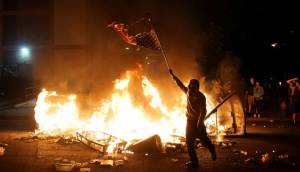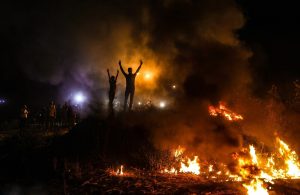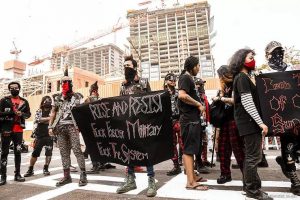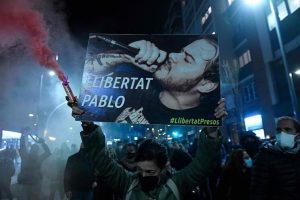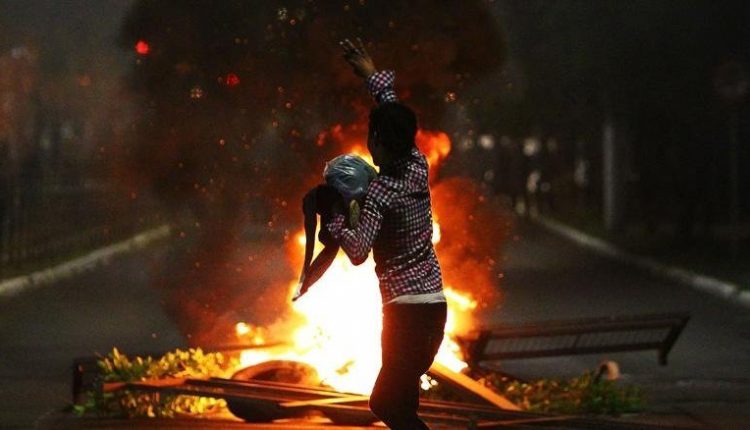
Introduction
On November 19th, 2020, the eve of “Black Consciousness” day in Brazil, security guards at the Carrefour retail store in Porto Alegre brutally murdered a black father of four named João Alberto Silveira Freitas while store employees and shoppers stood by (video of the murder can be viewed here). Following his murder, demonstrations and riots broke out in Porto Allegre and were generalized in regions across the country. As the uprising that followed caught international headlines, fascist President Bolsanaro’s vice president Hamilton Mourão claimed there is no racism in Brazil, blaming foreign influences such as Black Lives Matter for the public’s response.
Brazil is a country internationally known for its beautiful natural environment and diversity; an environment that faces relentless assault by the industrial ambitions of agribusiness , making homeless various indigenous groups who refuse western-christian assimilation, and a diversity that exists within a system of racial stratification and segregation built on slavery.
João Alberto Silveira Freitas’ murder at a Carrefour on November 19th is a product of a broader system of racism that can be witnessed across this post-colonial world. From the favelas of Brazil to the prisons of the United States, from the mines of South Africa to the refugee camps of Greece, the plagues of white supremacy and eurocentricism continue on to this day.
Just as we go to publish this interview, a new video has emerged of police in Brazil shooting an individual for the sole act of filming their abuse (Video in the Tweet below). Sadly such a video is nothing unusual. It’s just one more piece of evidence exposing the daily struggle of those deemed expendable by the status quo and its police enforcers. In Brazil, Black people make up about 50 percent of the population, but 75 percent of all homicide victims in the country, and 80 percent of those murdered by police .
We interviewed an anonymous Brazilian anarchist/abolitionist comrade about the situation in Brazil in order to bring attention to the struggles there and connect them to the broader struggle against white supremacy, capitalism, and the state.
– RAM (U.S.A.) & RadioFragmata (GR)
To what degree is Brazil’s “Black Consciousness Day” relevant to this uprising? Are there traditions or a history associated with the holiday that affected the response to the murder?
November 20th is a day known as Black Consciousness Day in Brazil. On this day we are supposed to remember the fall of the Quilombo dos Palmares and Zumbi dos Palmares. Quilombos dos Palmares was the biggest Quilombo [autonomous communities built by previously enslaved people who rebelled and escaped] in Brazil, and Zumbi was a warrior against slavery in Brazil. From 1680 to 1694 the Portuguese fought a relentless war on the Quilombo. Eventually the Quilombo was defeated. Zumbi, the courageous abolitionist, was eventually captured and beheaded on November 20th, 1695.
This day was built by the Black liberation movement in Brazil in opposition to the previously official “Black Consciousness Day” that was on the 13th of March, the day slavery “officially ended” in Brazil in 1888. The narrative and references defining Black Consciousness Day were re-claimed and re-appropriated by the movement in order to reject the praise for the royal family that “freed the slaves” going into the 19th century. [Since then] the day was recuperated by the state in Brazil in order to celebrate new false notions of black freedom when in actuality Brazil was the last country in the western hemisphere to abolish slavery “officially”.
With that said, you can imagine how João Alberto Silveira Freitas being brutally choked to death by security officers at the French-multinational Carrefour retail store on the dawn of Black Consciousness Day would inspire rage in Brazil’s black communities.
How is the multinational company Carrefour, whose security guards killed Freitas, positioned within Brazil? How prevalent and violent are these kinds of private corporation security guards?
Carrefour was quick to realize the public relations crisis that would come with the murder. Just recently on August 14th this year, there was another instance at a Carrefour where a product promoter died while working in a store, however instead of closing the store and calling an ambulance, the supermarket covered the body of the worker with umbrellas to be out of sight from shoppers and not disturb business hours.
Just a few years back in 2018 at a store in São Paulo, a black man was beaten and tortured for opening a can of beer inside the store.
These are a few famous cases that caught the media’s attention, but they are not isolated incidents. Loss prevention and security at supermarkets and retail stores in Brazil exist to wage a constant and aggressive campaign of intimidation and tension for poor and black people. Security staff are typically ex-police or off-duty police, and security companies typically are owned by police officials. In practice, security companies such as the one used by Carrefour that resulted in the murder of João Alberto Silveira Freitas in Porto Alegre are essentially para-military forces that use murder and torture to secure private property. While the murder of João Alberto Silveira Freitas was a terrible event and inspired an outrage, in a country where a black man dies every 23 minutes, it was not a surprise to most people, just fuel to the fire.
Do you think the uprising in response to the murder in Porto Alegre will be generalized across the country?
Its very difficult to predict anything In Brazil right now. Most feel that the tension simmering in Brazil could boil over at any moment. While resistance is happening, I should also note that ambitious left-wing parties are working to demobilize and recuperate the rage of the youth, feeling that such demonstrations could affect [left-wing politicians’] performances in upcoming elections.
However revolt against the killing of black youth is already happening everyday in Brazil, just in isolated incidents. Following the riots of 2013 against the Olympics, the World Cup, and transportation hikes, there was an explosion of radical organizing across the country that continues to this day. This better prepared mobilizations in instances such as the recent murder of João Alberto. The escalation and extent of revolt that happened in Porto Alegre in response to this murder had much to do in the contribution of young insurrectionists dedicated to direct action, with influences from the momentum built in 2013.
There are now a lot of different and organized radical collectives that didn’t exist or weren’t so organized in 2013 when we saw the huge riots that changed everything. When that comes again, we know that the people will be better prepared. In the two last mobilizations in front of the Carrefour in Porto Alegre, we saw a lot of young groups prepared and dedicated to the direct action, and that is a heritage from 2013.
Has the movement taken influence from the insurrection in the USA in response to the murder of George Floyd?
George Floyd was a huge influence. The way that João Alberto Silveira Freitas was murdered resembled a lot for people the abhorrent images of George Floyd’s murder. A disgusting man in uniform’s knee placed on someone’s neck while he shouted to breathe with people standing by filming; of course the connection was impossible to miss. Such images whether in Brazil or the USA can be seen as an almost ceremonial murder, a ritual of the white society to maintain the black population’s oppression. Everybody saw it, and the connection was undeniable. You even hear “Vidas Pretas Importam!” (Black Lives Matter!) and “Não Consigo Respirar!” (I can’t breathe!) shouted in the streets of Brazil during demonstrations against white supremacy.
How is white supremacy structured in Brazil, historically and today?
Brazil is an extremely segregated society. Race is also used to determine poverty: the prisons are predominantly Black while the wealthy neighborhoods are predominately light-skinned.
Brazil was the last country in the world to abolish slave labor, which is reflected in the social and racial stratification in Brazil. The political and business elite that rule Brazil are almost exclusively light-skinned and in many cases descend from ancestors that owned slaves. These origins are the defining roots of today’s racist nation-state known as Brazil.
Dehumanization is the constant Black experience in Brazil. Simply turning on television the viewer is bombarded with endless TV sitcoms celebrating the police abusing Black “criminals”. Much like the “United States” our diversity stems from slavery.
Even if these histories have adapted for the modern world of more polite torture and adapted segregation policies, those deemed excluded by Brazil’s settler-colonalist logic inside favelas or deep in the Amazon realize that the environment delegated and perpetuated for them by Brazil all stems from the Pelourinhos [Pelourinhos, a term derived from the pillories, meaning an area in the city where such devices as the pillory were used historically in Brazilian cities to publicly torture and humiliate disobedient slaves. Monuments to these locations still exist across Brazilian cities today].
What are some ways people can show solidarity with the struggles happening in Brazil from abroad?
Brazil’s elite are very insecure about their global standing. The middle and ruling class is very concerned with foreign judgment. Demonstrations at embassies and consulates are never a waste of time. Boycotting Brazilian products is something to always consider as most stem from agribusiness and industries heavily reliant on the systematic and endless assault conducted on indigenous people and their land.
While settler colonialist systems have been in place since the beginning of the Brazilian state, has President Bolsanaro’s administration intensified pogroms, or is he simply continuing the work as did the previous “leftist” president Lula da Silva?
Bolsanaro has doubled down on a war already waged on indigenous and Quilombolic communities, fueled by agribusiness or a ferocious ambition to conquer, decimate, and exploit the Amazon’s lands and liquidate the culture of its native peoples.
Bolsanaro is focusing on eradicating state protections of indigenous people more than prior administrations. Isolated tribes have also lost protections, and Christian missionaries have been encouraged by state agents to pursue previously uncontacted groups in the Amazon.
Since Bolsanaro there have been no new reservation land or expansions granted for indigenous people. Evictions are happening for Quilombolic communities as well. The previous government of Lula wasn’t much different in practice, yet Bolsanaro acts more swiftly and is more open and honest with his fascist intentions. Bolsanaro believes that capitalism must be in constant expansion at the expense of those deemed excluded and expendable by his eurocentric-fascist outlook. His goal is to wipe out both communities, and he sees no need for mercy or consideration until such a goal is done.
His rhetoric outside of policy, unlike Lula’s, has emboldened fascists, light-skinned ranchers and Christian groups to push harder in their efforts to eradicate wild land and indigenous people in pursuit of development, cultivation, and assimilation.
Are anarchists and or anti-fascist movements taking part in the resistance recently displayed in Brazil?
Yes they are. Since 2013 these types of demonstrations have had huge participation formally by anarchists, anti-fascists, and the radical left. This partly formed out of the demonstrations against the World Cup, Olympics, and transportation price hikes as mentioned earlier. Many insurrectionary youth are participating alongside riots in solidarity through attack. In demonstrations many anarchist flags can be seen. In the last years many Black anarchist groups have also formed. While two decades ago race and diversity were not as much of a concern in anarchist communities, it has become a huge dialogue point, and groups have also been radically diversified. Indigenous solidarity efforts have also been pushed hard by anarchist groups and communities.
What type of repression is happening by the state? Is it exacerbated by the Bolsonaro administration?
We saw the regular anti-riot repression in Porto Alegre and São Paulo, but not so heavy as we expected. Like, they repressed the demonstration with tear gas and rubber bullets, they arrested some people, but I think they are being careful not to escalate it the way the U.S. did.
Bolsanaro does not recognize the protests as valid, as the administration formerly denies the idea of systematic racism in Brazil. Very much in line with the Trump administration’s talking points. Local governments such as Sao Paulo though are trying to distance themselves from Bolsanaro because they recognize the threat to power posed by the insurrectionary violence displayed at these anti-racist demonstrations.
[DE] RAM/RadioFragmata Interview mit einem Genossen aus Brasilien zu den Ereignissen in Porto Alegre

